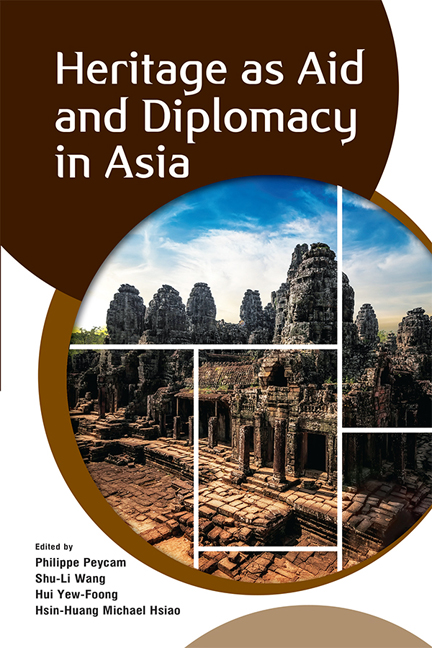Book contents
- Frontmatter
- Contents
- Contributors
- 1 Heritage as Aid and Diplomacy in Asia: An Introduction
- 2 World Heritage and WikiLeaks: Territory, Trade and Temples on the Thai-Cambodian Border
- 3 Heritage Making – Aid For Whom? The Genealogy of Expert Reports in the Hands of Politics and Their Impact in the Case of Preah Vihear
- 4 The International Coordinating Committee for Angkor: A World Heritage Site as an Arena of Competition, Connivance and State(s) Legitimation
- 5 Legacies of Cultural Philanthropy in Asia
- 6 To Help or Make Chaos? An Ethnography of Dutch Expertise in Postcolonial Indonesia
- 7 Heritage Conservation as a Tool for Cultural Diplomacy: Implications for the Sino-Japanese Relationship
- 8 From Ideological Alliance to Identity Clash: The Historical Origin of the Sino-Korean Goguryeo Controversies
- 9 Nationalism, Politics and the Practice of Archaeology in Afghanistan: A Case Study of Bamiyan
- 10 Disappearing Voices: The Politics and Practice of Safeguarding Kunqu Opera in the People’s Republic of China
- 11 Neoliberalizing Heritage: International Agencies and the Local Dynamics of Heritage Conservation in Bali, Indonesia
- 12 Heritage Conservation as Trickle-Down Development
- Index
2 - World Heritage and WikiLeaks: Territory, Trade and Temples on the Thai-Cambodian Border
Published online by Cambridge University Press: 10 November 2020
- Frontmatter
- Contents
- Contributors
- 1 Heritage as Aid and Diplomacy in Asia: An Introduction
- 2 World Heritage and WikiLeaks: Territory, Trade and Temples on the Thai-Cambodian Border
- 3 Heritage Making – Aid For Whom? The Genealogy of Expert Reports in the Hands of Politics and Their Impact in the Case of Preah Vihear
- 4 The International Coordinating Committee for Angkor: A World Heritage Site as an Arena of Competition, Connivance and State(s) Legitimation
- 5 Legacies of Cultural Philanthropy in Asia
- 6 To Help or Make Chaos? An Ethnography of Dutch Expertise in Postcolonial Indonesia
- 7 Heritage Conservation as a Tool for Cultural Diplomacy: Implications for the Sino-Japanese Relationship
- 8 From Ideological Alliance to Identity Clash: The Historical Origin of the Sino-Korean Goguryeo Controversies
- 9 Nationalism, Politics and the Practice of Archaeology in Afghanistan: A Case Study of Bamiyan
- 10 Disappearing Voices: The Politics and Practice of Safeguarding Kunqu Opera in the People’s Republic of China
- 11 Neoliberalizing Heritage: International Agencies and the Local Dynamics of Heritage Conservation in Bali, Indonesia
- 12 Heritage Conservation as Trickle-Down Development
- Index
Summary
It is typically said that heritage is always political. Such a statement might refer to the everyday politics of local stakeholder interests on one end of the spectrum or the volatile politics of destruction and erasure of heritage during conflict on the other. If heritage is always political, then one might expect that the workings of World Heritage might be especially fraught, given the international dimension. In particular, the intergovernmental system of the United Nations Educational, Scientific and Cultural Organization (UNESCO) World Heritage programme must navigate the inherent tension between state sovereignty and nationalist interests and the wider concerns of a universal regime (Francioni 2008; Pavone 200 The 1972 Convention concerning the Protection of World Cultural and Natural Heritage and its list of over a thousand properties has many such contentious examples, including sites in Israel, Mali, Syria, Crimea, Congo and Cambodia. As an organization, UNESCO was born of war, with an explicit mission to end global conflict and help the world rebuild materially and morally (Guitton 2006), but it has found its own history increasingly entwined with that of international politics and violence.
If heritage is, and always has been, political, then I would argue that the scale and complexity of those politics is intensifying (Meskell 2013; Meskell et al. 2015). Globalization and world-making projects, like the UNESCO World Heritage programme, have changed the stakes for particular heritage sites through processes of greater interdependence and connectivity, transforming them into transactional commodities with exchange values that transcend their historical or material characteristics and that can be wrested from those contexts to serve other international interests. Of course, heritage is also always political, too, in domestic arrangements, particularly when governments intervene in the material lives of their citizens, local peoples and other connected communities. But how do archaeologists assess the political when so much remains largely anecdotal, imagined, protected and typically occluded from view in complex international circuits? How might we see realpolitik at work? In this article, I show how the diplomatic cables released by WikiLeaks in 2010 allow us an unprecedented vantage on to one contested archaeological site, Preah Vihear Temple in Cambodia (Figure 2.1).
- Type
- Chapter
- Information
- Heritage as Aid and Diplomacy in Asia , pp. 17 - 51Publisher: ISEAS–Yusof Ishak InstitutePrint publication year: 2020



